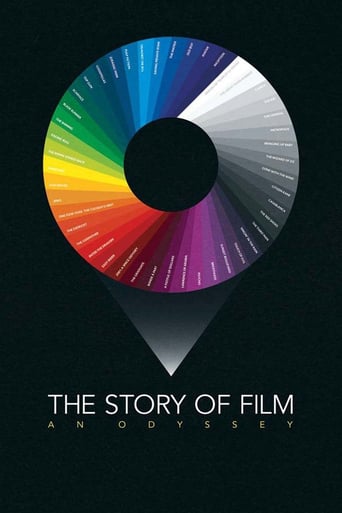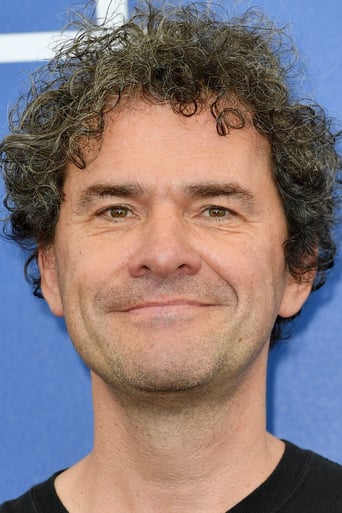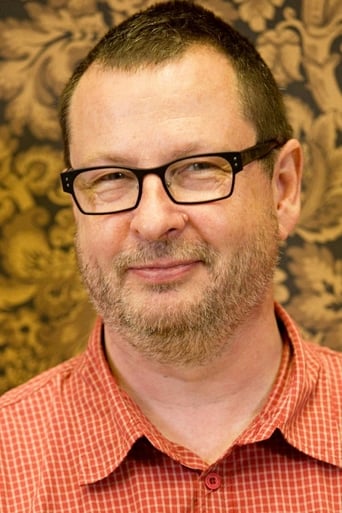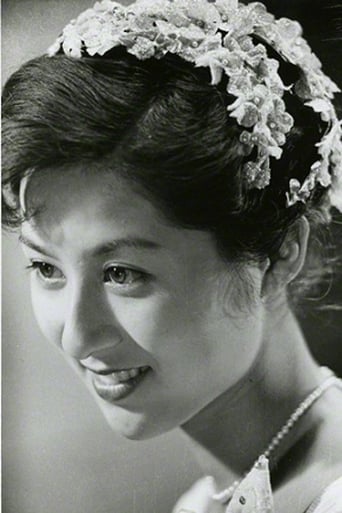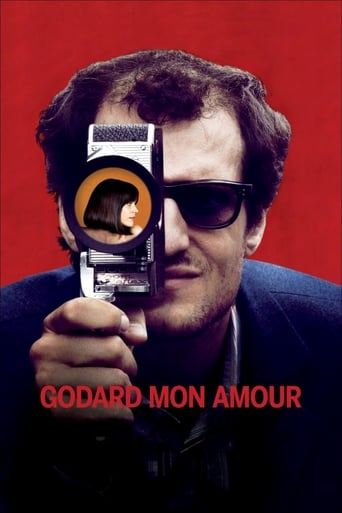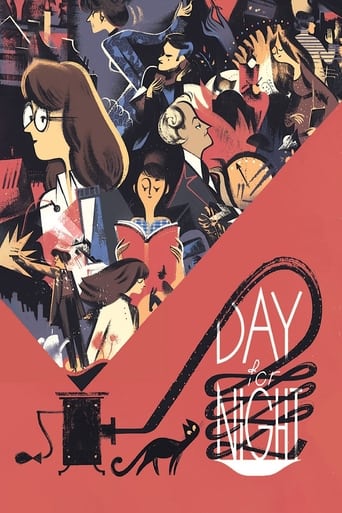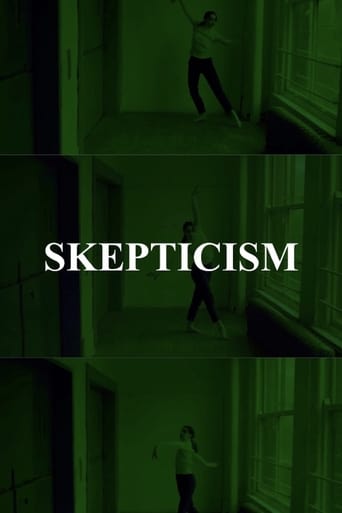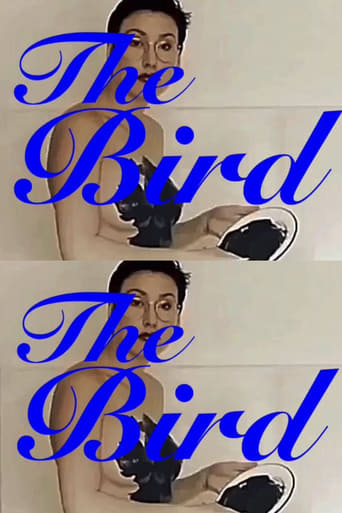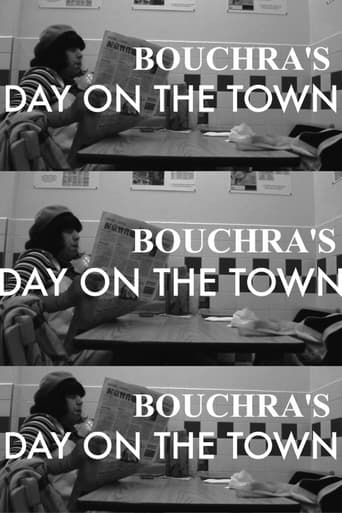The Story of Film: An Odyssey (2011)
The story of international cinema told through the history of cinematic innovation. Covering six continents and 12 decades, showing how film-makers are influenced both by the historical events of their times, and by each other.
Watch Trailer
Cast
Similar titles
Reviews
The Age of Commercialism
As Good As It Gets
Yo, there's no way for me to review this film without saying, take your *insert ethnicity + "ass" here* to see this film,like now. You have to see it in order to know what you're really messing with.
what a terribly boring film. I'm sorry but this is absolutely not deserving of best picture and will be forgotten quickly. Entertaining and engaging cinema? No. Nothing performances with flat faces and mistaking silence for subtlety.
This is likely the most comprehensive "story of film" ever produced and the content is utterly brilliant. However, Mark Cousin's rather high- pitched, totally monotonous voice which lacks any tonal or volume variation whatsoever, combined with an accent which renders EVERY sentence a question, makes this a nearly unwatchable (or rather unlistenable) program. Ultimately, I wound up watching with the sound off and the subtitles on (no doubt missing much), as his voice became an aural ice pick to my hearing. EXTREMELY unfortunate. I would do ANYTHING for him to have hired an actual voice-over narrator to carry these duties. If the content had not been so extraordinary (and amazingly produced), I'd have given this far fewer than 6 stars based on the narration alone. One of the best remakes that could ever be produced would be this series with ZERO changes other than Peter Coyote (for instance) narrating it.
I chose to watch the series because I know very little about film, and this seemed a good place to learn its history. I am finding it very educational. Some other commenter mentioned the many films he left out. I don't mind because I am familiar with most of the Hollywood classics. I am enjoying the more little known films and foreign films in this documentary that I never would have known about otherwise. But.....that accent. Holy moly. I can't bear to listen to him anymore. Another commenter said that he watched it with the captions turned on. I find that to be an excellent idea. I am going to try it because his accent makes me want to stick something sharp into my eyeball to distract me from the irritation. Dear Mark Cousins, should you ever decide to make another documentary, please hire a narrator. It's not your strong suit. Sincerely, One-eyed film reviewer
Finally, after six weeks, my endurance finally triumphed over the 900 minutes of Mark Cousin's "Story of Film: an Odyssey", a series of 15 one-hour documentaries starting with the same close-ups that set the documentary's tone of unpredictability to those who expected Scorsese or Tarantino to lead the show: Stanley Donen, Lars Von Trier, Amitab Bachchan, Kyōko Kagawa, Jane Campion and Sharmila Tagore. Not familiar with them? Wait, you've seen nothing yet.First and immediate impression: it was an extraordinary trip, yet the ending was a bit of a letdown. I didn't expect the sight of people walking in circle, hand-in-hand, in some African town, to close such an epic tour, a tour-de-force as far as documentary is concerned but again, with this constant and sometimes infuriating tendency to surprise you. In fact, the last shot of Cousin's documentary is revealing of both his work's strength and flaw: it guides your eyes toward new horizons, where film-making was expressed to its fullest by artists who took the absence of means as a mean by itself and contributed to mark their country in International Cinema's map; on the other hand, it's a slap in the face of all the movie-buffs giving the most obscure movies the publicity that posterity didn't grant them.For instance, there had to be a reason why "The Great Train Robbery" was the first film remembered for having used editing as a significant part of the narrative, yet Cousins pays tribute to an unknown movie about firemen. Watching his doc made me feel like the most confused movie fan ever wondering why some indisputable classics got the same treatment than some obscure Russian, Brazilian or Scandinavian movies. Hitchcock borrowed his use of suspenseful sequences and some low angle shots from Danish and German cinema while "Citizen Kane"'s use of backgrounds was inspired by Ozu. No star of the reel invented the wheel, cinema was only the result of a series of innovations, and Cousins' speaks like the advocate of all the pioneers whose creations were shadowed by the cinematic light of glory they generated a posteriori.But then, as if he was exhilarated by his own subversion, Cousins goes as far as suggesting that "Casablanca" isn't a classic film, but a romantic of some sort... his statement is so bold it flirts with indecent blasphemy, the one that'd convince many viewers to stop watching (that, and from what I've read, an annoying voice-over but I saw it dubbed in French, so it wasn't an issue for me) Sure, the man is entitled to his own bias against mainstream or Hollywood cinema but I tend to agree with the angry crowd that some of his statements were particularly upsetting. Then, I looked at the documentary with more magnanimous eyes, and if in the worst case, it made me raise my eyebrows, in the best, I discovered some little gems I felt the urge to watch as soon as the documentary ended. That 'best case' is the odyssey's reason to be.And the highlight of this incredible journey was undoubtedly the part about European radical directors in the late 70's and early 80's. It was an insightful introspection into the use of the camera as a social weapon. Generally speaking, the middle section of the film, from the 50's to the early 80's is the best part before the film loses its beat. Although I agree that the digital revolution canceled all the magic and the miracle of Cinema, I expected more flamboyance, something honoring the dream-like escapism it provided. And this comes from someone who's not too much into spectacular blockbuster, but I was probably one of the few to be upset because the film was on the same wavelength than I.The 90's were the ultimate gasp of realistic cinema, with an interesting focus on Iranian Cinema, and a new Danish school of more austere and naturalistic film-making, borrowed from the heritage of Carl Theodore Dryer. As an aspiring film-maker, it comforted me (perversely, I confess) that I can make movies with basic tools and 'pretend' its Art. And in the 2000's the loop was looped, Cinema went back to its roots, understanding that its purpose is to show a form of reality that distorts the real without taking too much distance from it. It's also an extraordinary medium to extrapolate human's deepest fears and emotions, in fact, Cinema is a universe where human is in the center.With that in mind, you forgive some liberties and analytical shortcuts. Some of my favorite directors were missing, Cassavetes (a quick glimpse on "Shadows" while the father of Indie cinema deserved more), Melville the one who didn't want to part of the New Wave and modernized the film-noir genre, John Huston, and Akira Kurosawa. I understand he's a fan of Ozu, but how can you neglect "Rashomon", the first film without a linear narrative and to use the unreliable narrator device. Did that annoying Christmas baulb metaphor make him lose precious minutes? But I guess out of 900 minutes, with a ratio of 1 learning from each, there are chances some ideas won't be 100% pleasing or even accurate, but remember what they say about education, it's what remains after you forgot everything.Well, I'm not sure I'll remember everything from that 15-hour exhaustive documentary but there are many new movies I'm familiar with, new insights about the art of filmmaking, as the greatest art-form when it comes to express some emotions, on the use of the human body, a well-made close-up being worth a thousand images, it's about names that has sunk into oblivions but in their way took part the process that lead to the classics we adore now. It's a collective work where every piece of humanity, at any time, had a share of it..And if only for that, I've got to hand it to Mark Cousins for having enriched my knowledge of Cinema.
If what you want is an obvious western view of the history of film narrated by, say, Patrik Stewart, don't watch this. Cousins Ulster brogue requires a little getting used to and much of this is his (well informed) personal opinion, but if you can stick with the low budget, stylised camera work and editing it is a joy. The descriptions of various styles of cinematography and editing as opposed to film text and meaning is inventive and informative, very different to the often imposed micro analysis you get from film studies text. I loved hearing cousins say things like "...deep space, shallow focus...single take, no fast cutting..." I soon found myself looking at films thinking Cousin-like about what I Was seeing on screen.I learnt about how different directors and cinematographers influenced each other, how styles emerged, faded, and reemerged. How new directors from different countries, influenced by Hollywood, reshaped those ideas and created new personal films reflecting the psyche of their own nations. Cousin's odyssey is like a poem, his narration is often abstract yet personal. But it is exciting and informative, a different take on a subject history that all to often is written in stone. Refreshing and far from obvious this deserves far more respect than some people give it.
